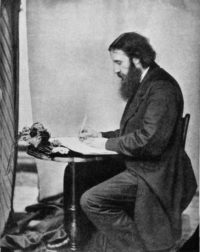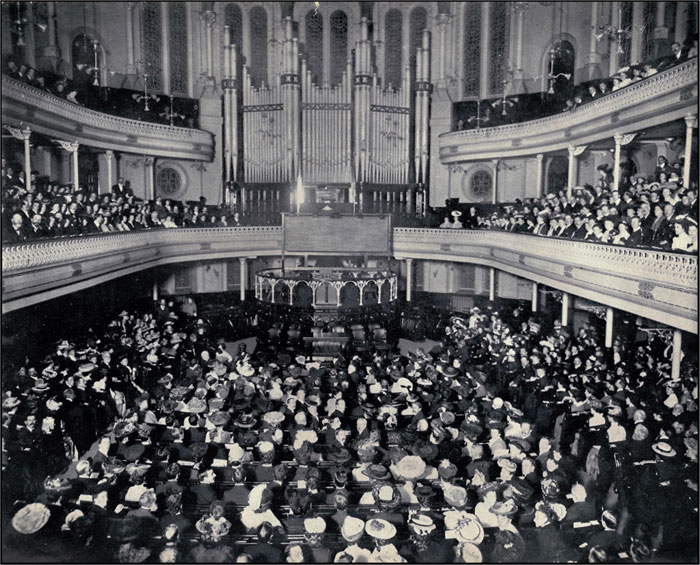George MacDonald: Truth in Jesus
I know hardly any other writer who seems to be closer, or more continually close, to the Spirit of Christ Himself. Hence his Christ-like union of tenderness and severity. Nowhere else outside the New Testament have I found terror and comfort so intertwined. … (C.S. Lewis, Preface to The Great Divorce)
 George MacDonald’s Unspoken Sermons are not writings I can read lightly. Each year, I read a few of them. I still haven’t read the whole volume, but I write down when I read each sermon on its first page. They would reward reading them in order, because they build on each other. But they are so dense and provocative that I can’t bring myself to try.
George MacDonald’s Unspoken Sermons are not writings I can read lightly. Each year, I read a few of them. I still haven’t read the whole volume, but I write down when I read each sermon on its first page. They would reward reading them in order, because they build on each other. But they are so dense and provocative that I can’t bring myself to try.
This week I read two: “Self Denial,” and “The Truth in Jesus.” I find the second one gives me a lot of encouragement. It focuses on the difference between knowing opinions about Jesus, and knowing Jesus. The prevalence of opinion, often promulgated as “what the Bible says,” is one of the hindrances to those who might otherwise come to faith, MacDonald suggests. How do you know Jesus himself? Do what he says.
He begins with this passage from a notable (though unnamed) contemporary who says God cannot be known:
The visiting on Adam’ descendants through hundreds of generations dreadful penalties for a small transgression which they did not commit; the damning of all men who do not avail themselves of an alleged mode of obtaining forgiveness, which most men have never heard of; and the effecting a reconciliation by sacrificing a son who was perfectly innocent, to satisfy the assumed necessity for a propitiatory victim; are modes of action which, ascribed to a human ruler, would call forth expressions of abhorrence; and the ascription of them to the Ultimate Cause of things, even not felt to be full of difficulties, must become impossible.
MacDonald agrees that this representation of the gospel is a “false system” reminiscent of “paganism.” Wikipedia sums up his theology this way:
MacDonald rejected the doctrine of penal substitutionary atonement as developed by John Calvin, which argues that Christ has taken the place of sinners and is punished by the wrath of God in their place, believing that in turn it raised serious questions about the character and nature of God. Instead, he taught that Christ had come to save people from their sins, and not from a Divine penalty for their sins: the problem was not the need to appease a wrathful God, but the disease of cosmic evil itself.
Christ allowed evil to spend itself on him, thus defeating it.
MacDonald’s sermon is music to my ears. Putting him in a theological context, I can see that he’s not off in left field somewhere, but in sympathy with the Greek church fathers. Regardless of what church I may be attending, my heart goes that way as well.
For MacDonald, this Calvinist theology, however much traction it has gained, must be distinguished from the Bible:
Of those whose presentation of Christian doctrine is represented in the quotation above, there are two classes — such as are content it should be so, and such to whom those things are grievous, but who do not see how to get rid of them. To the latter it may be some little comfort to have one who has studied the New Testament for many years and loves it beyond the power of speech to express, declare to them his conviction that there is not an atom of such teaching in the whole lovely, divine utterance; that such things are all and altogether the invention of men. . . Thank God, we are in nowise bound to accept any man’s explanation of God’s ways, and God’s doings, however good the man may be, if it do not commend itself to our conscience.
So what is the solution? First, remember that human opinion, set forth as a preoccupation with doctrinal “correctness,” in not what saves:
. . .supposing your theories right, and containing all that is to be believed, yet those theories are not what makes you Christians, if Christians indeed you are. . . For when you say that, to be saved, a man must hold this or that, then you are leaving the living God and his will, and putting trust in some notion about him or his will.
Instead, obey:
Do you ask, “What is faith in him?” I answer, The leaving of your way, your objects, your self, and the taking of his and him; the leaving of your trust in men, in money, in opinion, in character, in atonement itself, and doing as he tells you. . .
. . . What have you done this day because it was the will of Christ? Have you dismissed, once dismissed, an anxious thought for the morrow? Have you ministered to any needy soul or body, and kept your right hand from knowing what your left hand did? Have you begun to leave all and follow him? Did you set yourself to judge righteous judgment? Are you being ware of covetousness? Have you forgiven your enemy? Are you seeking the kingdom of God and his righteousness before all other things? Are you hungering and thirsting after righteousness? Have you given to some one that asked of you? Tell me something that you have done, are doing, or are trying to do because he told you. If you do nothing that he says, it is no wonder that you cannot trust him, and are therefore driven to seek refuge in the atonement, as if something he had done, and not he himself in his doing were the atonement.
This is a detailed, practical list. The beliefs will “come right” as long as we are following Jesus.
This is just a “nutshell” version of the sermon, but it’s enough to capture the gist and set me on course. “Fixing our eyes on Jesus,” and doing what he says, are the heart of faith. Not only does this challenge and convict and inspire me. It relieves me, reminding me that I have permission to let all human opinion go.





2 Comments
Barbara H.
This is actually troubling to me. The “effecting a reconciliation by sacrificing a son who was perfectly innocent, to satisfy the assumed necessity for a propitiatory victim” is pictured in the OT sacrifices which are symbolic of what happened with Christ. I don’t see how he can say “there is not an atom of such teaching” in the Bible about penal substitution and the wrath of God (which existed long before Calvin) when it is all through the NT, particularly Romans and Hebrews and even 1 John..
Janet
There are other ways of understanding those passages, apparently. Coming out of an evangelical background, I also have only heard the interpretation you describe here. But the Orthodox church has a different, and older, way of understanding these things.